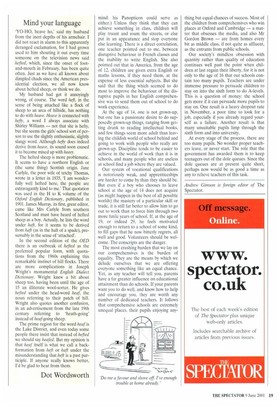Mind your language
`YO-HO, heave ho,' said my husband from the inert depths of his armchair. I did not react in alarm to this apparently deranged exclamation, for I had grown used to him shouting it out every time someone on the television news said hefted, which, since the onset of footand-mouth in February, has been quite often. Just as we have all known about dimpled chads since the American presidential election, we all now know about hefted sheep, or think we do.
My husband had got it annoyingly wrong, of course. The word heft, in the sense of being attached like a flock of sheep to an area of hillside, has nothing to do with heave. Heave is connected with hefty, a word I always associate with Shirley Williams — not that she is hefty, but she seems the girls'-school sort of person to use the slightly enthusiastic, slightly slangy word. Although hefty does indeed derive from heave, its sound soon caused it to become mixed up with heavy.
The hefted sheep is more problematic. It seems to have a northern English or (the same thing) Scottish origin. Jane Carlyle, the poor wife of tetchy Thomas, wrote in a letter in 1835, 'I am wonderfully well hefted here; the people are extravagantly kind to me.' That quotation was used in the H to K volume of the Oxford English Dictionary, published in 1901. James Murray, its first, great editor, came like Mrs Carlyle from southern Scotland and must have heard of hefted sheep as a boy. Actually, he lists the word under haft, for it seems to be derived from haft (as in the haft of a spade), presumably in the sense of 'attached'.
In the second edition of the OED there is an outbreak of hefted as the preferred popular form, with quotations from the 1960s explaining this remarkable instinct of hill flocks. There are more complications in Joseph Wright's monumental English Dialect Dictionary. Wright knew a bit about sheep too, having been until the age of 15 an illiterate wool-sorter. He gives hefted under the head-word heaf, the noun referring to their patch of hill. Wright also quotes another confusion, in an advertisement from the late 19th century referring to 'heath-going' instead of heaf-going sheep.
The prime region for the word heaf is the Lake District, and even today some people there insist that instead of hefted we should say heafed. But my opinion is that heaf itself is what we call a backformation from heft or haft under the misunderstanding that heft is a past participle. If anyone really knows better, I'd be glad to hear from them.
Dot Wordsworth


































































 Previous page
Previous page